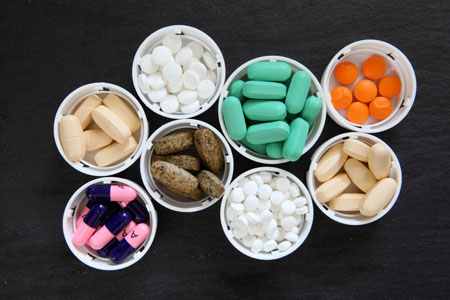Zoloft
Although sertraline is a medication used to treat mental health problems such as depression and anxiety, it is often used in the treatment of drug and alcohol withdrawal. If you are going through a detox, you may be prescribed sertraline as part of your treatment. Read on to find out more about how it can help to ease the symptoms of withdrawal.

What Is Sertraline?
Sertraline is an antidepressant drug known as an SSRI (selective serotonin reuptake inhibitor). It is primarily used in the treatment of conditions that are caused by an imbalance of chemicals in the brain, namely depression and anxiety disorder. Sertraline works by addressing this chemical imbalance, which in turn improves mood. It is for this reason that it has proved to be an effective treatment for those who may be likely to suffer from symptoms of depression and anxiety during drug or alcohol withdrawal.
The use of sertraline can help recovering addicts to stick with their detox programme, where they might otherwise return to their drug of choice to help relieve the unpleasant withdrawal symptoms.
Call our admissions line 24 hours a day to get help.
- Zoloft
- Lustral
- Sertranex
- Asentra
- Gladem
- Stimuloton
- Apo-Sertral
- Concorz
- Serlain
- Xydep
History of Sertraline
In the 1970s, Pfizer began working on the production of a series of psychoactive compounds. Of this series, a drug called tametraline appeared to be the most promising. However, because of its stimulant properties, work in it was discontinued.
Nevertheless, in 1977, biochemist Kenneth Koe and chemist Willard Welch began synthesizing and testing derivatives of tametraline. After preparing stereoisomers of one particular compound and asking animal behavioral scientist Albert Weissman to test it in vivo, they discovered what was to become sertraline.
Sertraline was approved for use in the UK in 1990 and by the US FDA in 1991.
What Substance Abuse/Addictions Is Sertraline Used to Treat?
- Alcohol Addiction
- Cocaine Addiction
Is Sertraline Addictive?
Sertraline is not an addictive drug and is safe for long-term use. Nonetheless, it is recommended that use is tapered before discontinuation due to the risk of withdrawal symptoms.
What Is the Mechanism of Action?
The precise mechanism of action of sertraline is not fully understood. However, as an SSRI drug, it works by preventing the reuptake of serotonin in the brain. It is believed that a serotonin deficiency in the brain can lead to problems such as anxiety and depression. By preventing the brain from removing serotonin, the chemical imbalance can be restored and therefore mood improved.
How Long Does It Take for Sertraline to Work?
In some patients, the mood may improve relatively quickly. You may also notice an improvement in energy levels quite quickly, but it may take between two to four weeks to notice an improvement in anxiety and depression symptoms.
Sertraline is safe to use for many years, which can help to prevent a relapse of symptoms.
Call our admissions line 24 hours a day to get help.
Does Sertraline Have Any Interactions?
There are a total of 1071 drugs that are known to have an interaction with sertraline. A major drug interaction is expected with 263 of these, while a moderate interaction can occur with 795 drugs. A further 13 drugs may result in a minor interaction.
It is recommended that alcohol use is limited or avoided when taking sertraline because of the risk of increased side effects such as difficulty concentrating, impaired thinking, dizziness, and drowsiness.
Sertraline may also interact with the following health conditions:
- Glaucoma
- Hyponatraemia
- Platelet function
- Liver disease
- Kidney dysfunction
Should Any Precautions Be Taken?
If you are being treated with methylene blue injection or are taking pimozide, you should not take sertraline.
Sertraline should not be used within fourteen days of using an MAO inhibitor such as rasagiline, tranylcypromine, isocarboxazid, phenelzine, or selegiline.
Antidepressants can result in suicidal thoughts among young people when they first start taking them. If you notice a change in your moods, it is important that you report this to your doctor. You should also make your family members aware of this risk so that they are alert to any changes in your behavior or mood.
There is a risk of serotonin syndrome with sertraline. Should you notice any of the following symptoms while taking sertraline, it is important that you speak to your doctor immediately:
- Hallucinations
- Agitation
- Shivering
- Fever
- Sweating
- Muscle stiffness
- Diarrhoea
- Rapid heartbeat
- Loss of coordination
- Nausea
- Vomiting
- Twitching
If you are taking disulfiram, you should not take the liquid form of sertraline as this could lead to a severe reaction to disulfiram.
Your doctor will need to ensure that it is safe for you to take sertraline. As such, you should inform him or her if you have, or have had, any of the following:
- Bleeding problems
- Bipolar disorder
- Seizures
- Kidney disease
- Liver disease
- High blood pressure
- Heart disease
- Stroke
- Heart attack
- Low sodium levels in your blood
It is important to inform your doctor of any medication that you are taking to ensure there are no interactions that could cause serotonin syndrome. If you are taking any medication, including birth control pills, over-the-counter medication, herbal remedies, vitamin supplements or prescription drugs, be sure to let your doctor know.
There is a risk of complications and birth defects in unborn babies if sertraline is taken during pregnancy.

Nevertheless, suddenly stopping the medication could result in a return of symptoms. It is, therefore, important to speak to your doctor if you discover that you are pregnant while taking sertraline.
You should also inform your doctor before taking this medication if you are pregnant or planning to become pregnant. You should also let your doctor know if you are breastfeeding before taking sertraline as it is not known if it can pass to breast milk and subsequently cause harm.
Sertraline is approved for treating children under the age of 18 for OCD but not depression. It should not be given to children without the recommendation of a medical professional.
Call our admissions line 24 hours a day to get help.
What are the Side Effects of Sertraline
There are several common side effects associated with sertraline, including:
- Nausea
- Headaches
- Trouble sleeping
- Diarrhoea
- Fatigue
- Drowsiness
- Weakness
- Dizziness
- Ejaculation problems
These symptoms do not usually require medical attention; however, if they become severe or do not subside, you should inform your doctor.
There is also a risk of more serious symptoms, which should be reported to your doctor immediately. These include:
- Severe headaches
- Memory problems
- Trouble concentrating
- Seizures
- Suicidal thoughts
- Shortness of breath
- Chest pain
- Fainting
- Yellow skin or eyes
If you notice the signs of an allergic reaction, it is important to seek urgent medical attention. This includes:
- hives
- rash
- difficulty breathing
- swelling of the throat, tongue, lips, mouth, or face
Can You Just Stop Taking Sertraline?

It is not recommended that you suddenly stop taking sertraline without the advice of a doctor. If you suddenly stop taking your medication, it could result in a return of your depression or anxiety symptoms. There may also be other withdrawal symptoms such as nausea, abdominal cramps, dizziness, and sweating.
To avoid withdrawal symptoms, it will be necessary to taper your dose over the course of several weeks.
Facts/Statistics
- Sertraline is a regularly prescribed antidepressant because it has fewer side effects than other antidepressants.
- Sertraline is available in tablet form on prescription only.
- For the treatment of depression and anxiety disorders, sertraline usually takes 4-6 weeks to have full effect.
- Sertraline is typically taken once per day either with or without food.
- The typical dose for adults is 50 mg per day with a maximum dose of 200 mg per day.
Call our admissions line 24 hours a day to get help.

